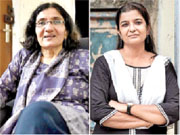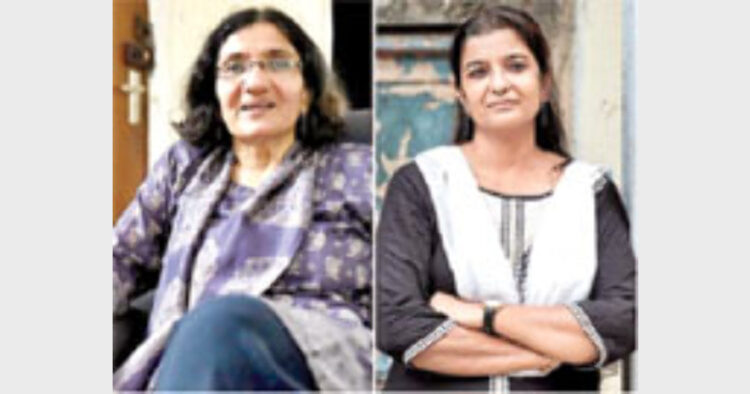 Zakia Soman and Noorjehan Safia Niaz, founding members of the Bharatiya Muslim Mahila Andolan (BMMA) and the women who tirelessly worked for spearheading the campaign to end triple talaq in the Muslim society seem to be the happiest after the practice of Triple Talaq was declared ‘unconstitutional’ by the apex court. In an interview to the Organiser Correspondent Nishant Kumar Azad, they share their views. Excerpts :
Zakia Soman and Noorjehan Safia Niaz, founding members of the Bharatiya Muslim Mahila Andolan (BMMA) and the women who tirelessly worked for spearheading the campaign to end triple talaq in the Muslim society seem to be the happiest after the practice of Triple Talaq was declared ‘unconstitutional’ by the apex court. In an interview to the Organiser Correspondent Nishant Kumar Azad, they share their views. Excerpts :
How do you see this verdict of honourable Supreme Court on triple talaq?
This verdict is historical. It is heartening that howsoever imperfect, we are a functioning democracy. The Muslim women have suffered legal discrimination in our country and this judgment marks a kind of beginning in the direction of alleviating that. Although we do have a long way to go but, nevertheless, this judgment is positive.
How do you define your struggle?
This judgment has come about after a painstaking struggle by thousands of Muslim women who fought against all odds. We have been harassed, maligned and bad named by conservatives who want to preserve the male status quo. We were up against well-entrenched and powerful patriarchal forces. But today we have won and they have suffered a loss of face. The truth has prevailed and the efforts of women have borne fruit. It is important to say here that ordinary women have made this possible.
AIMPLB has been opposing the abolition of
triple talaq.
AIMPLB is a body of conservative and patriarchal
people. It is a private body and should not be given much importance. This body has always opposed any talk of reforms in the Muslim Personal Law. They have advocated for preserving practices such as triple talaq despite there being no sanction for it in the Quran. Today they stand utterly exposed and decimated. They have brought a bad name to Muslims and to Islam. We are happy that the
judgment has proved their stance wrong.
n Isn’t this decision, a great step for gender justice?
Ideally, we would have wanted a unanimous decision by the five-judge bench but there has been a diversity of
opinion, which we should respect. However, the ruling has set aside the practice of triple talaq by a majority of 3:2 and this is most significant. It is a great beginning for Muslim women who were subjected to this repulsive practice even after seventy years to India’s Independence. Armed with this judgment and emboldened by the public awareness on triple talaq now we need to embark on a comprehensive process of social reforms within the community. We need to educate and empower girls, youth and women about Quranic injunctions on gender justice and Constitutional principles and values. We must recognise that legal reform is part of a much larger process of social reform.
The key argument in the petition was that ‘triple talaq is against the Fundamental Rights’ which the court has not accepted.
Triple talaq and nikaah halala are quite clearly violative of fundamental rights of gender equality and discrimination. Ideally if there was a consensus in the Bench they could have gone much deeper into the nuances. We want some sort of a procedure to be laid down for divorce involving dialogue and mediation over a reasonable period of time, as mandated by the Quran through the talaq-e-ahsan method. Also, if divorce must happen, it should be just and fair. The woman should be provided for adequately.
What is your opinion on Uniform Civil Code?
Uniform Civil Code (UCC) is a separate issue; it should not be mixed up with triple talaq. The UCC question is for all Indians to deliberate on and not just by the Muslims. What we need is a comprehensive reform in Muslim Personal Law to give legal protection to Muslim women.
What is the way ahead?
India needs a Quran-based and Constitution-compliant Muslim family law to be passed by the Parliament. Ideally it should have happened when the Parliament passed the Hindu Marriage Act, 1955 and Hindu Succession Act, 1956. In this proposed law we want the age of marriage to be 18 and 21 respectively, for the bride and the groom, consent to be made mandatory, polygamy to be made illegal, divorce over a
period of minimum 90 days, mother to get custody and guardianship of children, women to get equal share in property and inheritance. We want qazis to be made accountable to this law, keeping in with the rights of women granted by the Quran. This would also be appropriate as per the Constitution. n













Comments